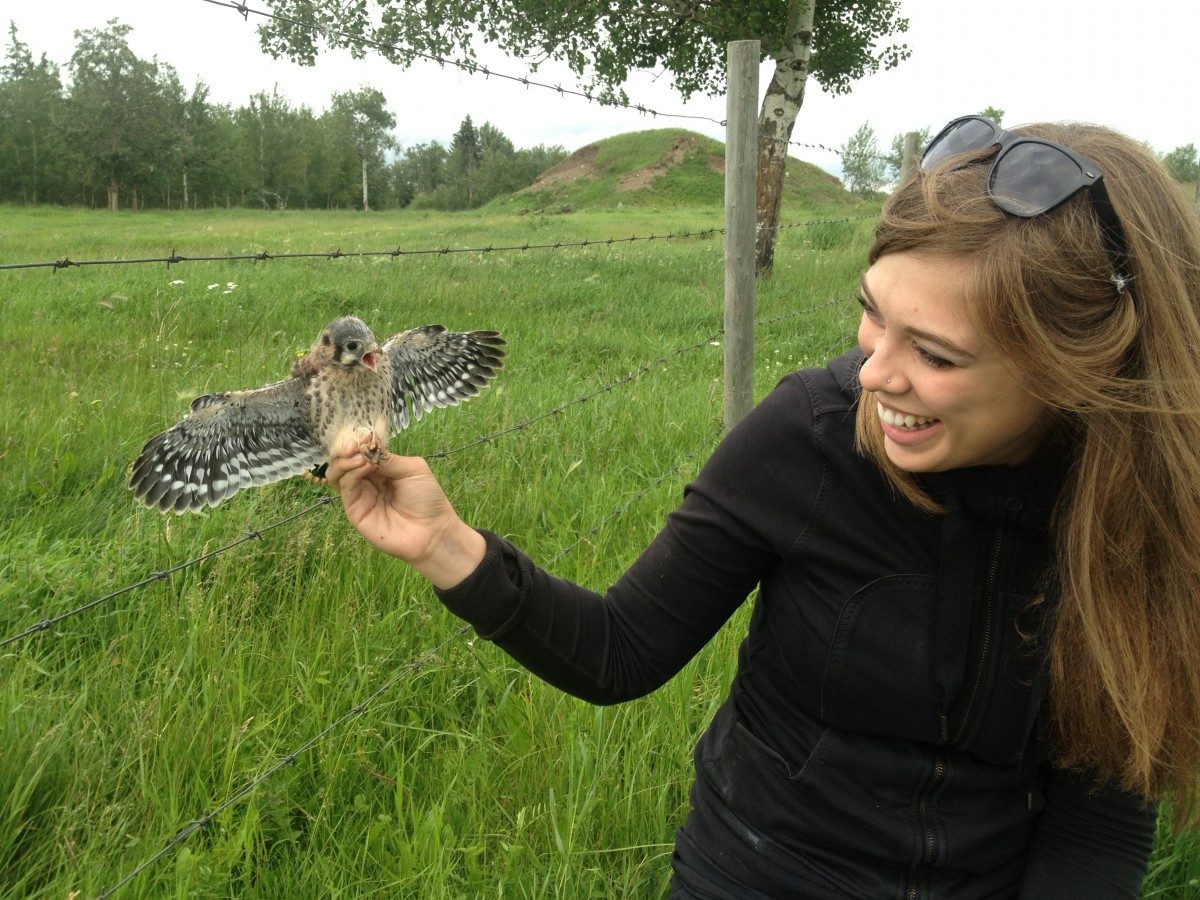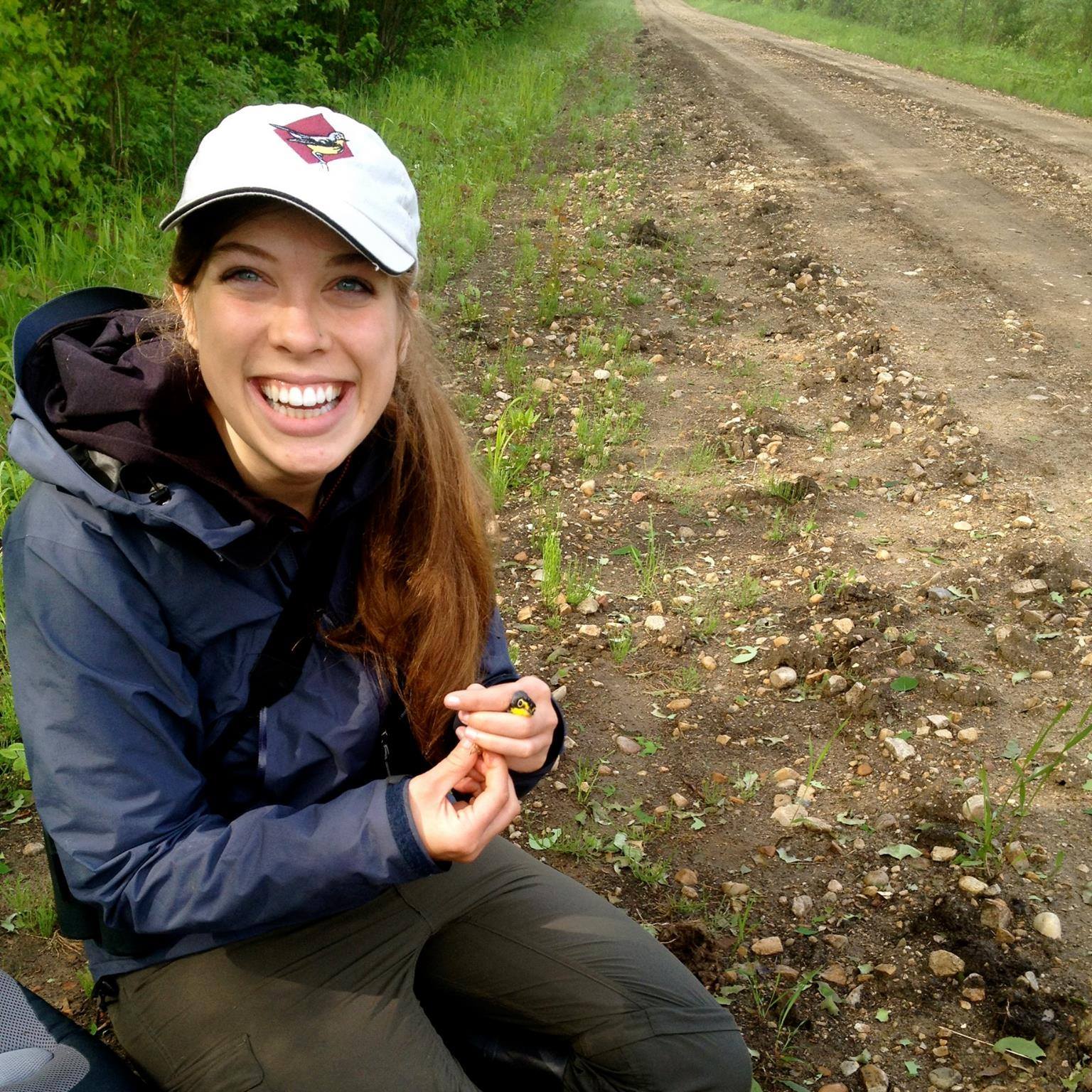
Image supplied.
‘It’s for the birds’: UofM MSc student wins top prize as ‘Canada’s New Noah 2018’
For someone used to sitting quietly in remote fields and forests waiting for songbirds to appear, Amélie Roberto-Charron’s life just got a lot more hectic. Not only has Roberto-Charron been chosen for a prestigious national scholarship, her research has been featured in an episode of a Quebec-based documentary television series.
In fact, the Masters student has just been named “Canada’s New Noah 2018” by Wildlife Preservation Canada. According to the WPC website, this award “… has been bestowed annually to one promising young Canadian wildlife biologist every year since 1988. Winners spend six months embedded in species recovery projects in the field in the Indian Ocean island nation of Mauritius, home of the fabled but ill-fated dodo; after which they are enrolled in a three-month course in Endangered Species Management at the Durrell Conservation Academy in partnership with The University of Kent.
Roberto-Charron was just notified of the award by WPC in February. Unsurprisingly, she was thrilled to find out that she had been chosen.
“I hope to one day work as a Species at Risk biologist in Canada; therefore, getting the opportunity to take a course and getting hands-on experience focused on endangered species management is priceless. The fact that it happens to be in Mauritius is an additional benefit of being chosen! This program is also run by the Durrell Wildlife Preservation Trust, and as I grew up reading books by their founder, Gerald Durrell, it’s quite surreal to have been selected!”
Roberto-Charron’s passion for what she does is essential, considering how arduous her research field trips can be, and the lengths she must go to in order to study her songbird subjects. A typical day starts about an hour before sunrise, after a night spent camping in the boreal forest near her field sites.
“We try to minimize the pre-field work tasks so that we can wake up and go. We pre-make breakfast and take it with us. Unfortunately, I have yet to work with someone that takes coffee as seriously as I do. So, in the interest of not wasting any time, I typically drink some cold coffee during the drive to the field site we plan to visit for the day. Once we arrive as close as we can get by vehicle, we hike into the forest, listening for Canada Warblers along the way.”

Image supplied.
The Canada Warbler (Cardellina canadensis) is a threatened migratory songbird. These distinctive little birds are yellow and slate-gray with a dark black necklace, migrating from Canada’s boreal forest to northern South America twice a year.
“The field work I conducted during my master’s research involves catching breeding male Canada Warblers, and deploying little light-level geolocators that track their migration on their backs like backpacks. These units don’t transmit any information, so to get any data from these units, I need to recover them. This means I need to return the next year to retrieve the units. So most of my field work over the last summer involved re-sighting Canada Warblers returning with geolocators that were deployed the year before. This was accomplished by listening for any singing Canada Warblers, spotting them, determining whether they are returning with a geolocator, setting up a badminton-like net (called a mist net) to catch them, setting up a song lure that will draw them in, catching them and retrieving the unit.
“Although this seems straightforward enough, it can sometimes be difficult to lure a bird that usually flies in the tree tops into a net that is only 3 meters tall! At times, we’ve had to get creative, and at one point last summer, we drove to the nearest city to pick up a set of painters poles so we could make our net taller.”
In addition to her amazing win of the title “Canada’s New Noah”, Roberto-Charron’s work was recently featured in the Quebecois television series “Fou des Oiseaux”. In her segment, Roberto-Charron and her assistant (UofM grad student Sabina Mastrolonardo) are shown at work in the field in eastern Manitoba. It’s a heady time for the affable ornithologist.
Roberto-Charron’s understandably proud P.I. is Biological Sciences Assistant Professor Kevin Fraser, whose work in migration ecology has made him a sought-after expert in the field. Fraser’s prior research has included a great deal of time in the tropics, making him a valuable source of practical advice on a variety of things, from the scientific aspects of Roberto-Charron’s research to the practical realities of having her mail forwarded and obtaining the necessary vaccines for her tropical adventure.
“Although this may seem like strange advice to value, at this point as I try to sort out the next steps of this journey, having guidance from Dr. Fraser has been invaluable to me. Since getting the news that I was selected as Canada’s New Noah, my mind has been frenzied with a never ending ‘To Do’ list of tasks that I need to undertake prior to leaving. That being said, I wouldn’t change it for the world!
Growing up in Edmonton, Alberta, Roberto-Charron was a naturally inquisitive child, often coming home with a variety of “critters”, wanting to keep them as pets. Since neither of her parents were particularly outdoorsy, Roberto-Charron’s pleas usually fell on deaf ears, although she was allowed to sleep in a tent in the backyard, rather than in her bedroom. Despite her love of nature, it wasn’t until her last year as an undergrad that Roberto-Charron discovered her current passion. Her advice to fellow UofM Sciences students is simple:
“Trust the process, and try to explore different fields. You never know what you’ll like!
“I personally discovered my love for ornithology in the final year of my undergraduate degree. It was through a program requirement that I wound up taking a biology of birds course. I recall trying to get out of that course, but I was unable to, as my academic advisor insisted I take it. Looking back, it seems that everything happens for a reason! That class got me interested in birds, and changed the course of my life!”







Excellent work!